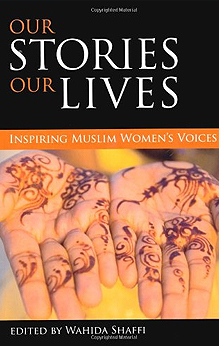
Author: Wahida Shaffi
Genre: Social Science
Publisher: Policy Press
Release Date: 2009
Format: Paperback
Pages: 152
Source: https://policy.bristoluniversitypress.co.uk/our-stories-our-lives
The editor Wahida Shaffi notes, “…I see a number of Muslim women who have achieved positions of influence – in local government, business, further and higher education, charities and other organisations. Women who care about the society in which they live in and bring up their children; women who increasingly find a voice together to promote values and who work together to make things happen”. Her book presents endearing contributions from twenty Muslim women of Bradford, who describe their often quite amazing life journeys from the late 1960s onwards. For insights into Muslim social history, this collection is an apt starting point.
Take for example the life of Barkat Bibi, in her 80s at the time of the interview, who recalled her arrival: “The government in England encouraged people to come to help work in the factories because they needed workers. They needed us and we needed them. It is still their country. Oh, we were in the tiniest aeroplane and my children were very small. And they were so scared they threw up all the way to London. And that’s when I first saw Goray people at Heathrow Airport. I couldn’t believe my eyes that these people had such fair skin! Back then I thought they were such beautiful people, so young and white skinned. I remember thinking God’s creation is amazing! Over the years I’ve got used to looking away when they kiss each other or when they’re legs all bare. You just have to try not to look. You’re supposed to cover it all up aren’t you, that’s what the Qur’an says. It doesn’t feel right, does it? But what do you do when everyone’s at it now!
“My husband used to work in a factory where they make parts for aeroplanes, welding parts together or something…He used to come home really tired and his beard would be all joined up and greasy with bits that had melted away with the heat. Every week without fail, right up until he retired he would hand over his earnings to me. A lot of us women used to save money by joining a committee, it’s usually managed by a group of women and you put money to one side every week and by the end of the year or however long you get what you saved…”
Another vivid account that captures the lives of these pioneering women is that of Arshad Begum Ajeeb “I never thought this shy little girl from a village would end up being the first ever Asian Lady Mayoress in Great Britain…I’d told my husband I wouldn’t be Lady Mayoress if he got elected. For a start my English wasn’t great…that year we were the second most photographed people in the country…I remember one of my first duties was to open a fair, you know like these mela’s for English people, and that was my first TV appearance as well. I was so nervous. I kept reciting the kalima under my breath to calm my nerves. We had to go to church quite a few times as well and when the English people read from their holy book, I recited my kalima and darood sharif instead. I stood up like they did but I said my prayers and my husband would say, “Don’t worry! They are just people as well like you and me!”
The other contributors to ‘Our Stories, Our Lives’ include a thirties-something Islamic activist, a widow who stepped into her late husband’s shoes and successfully ran the family restaurant, a young revert from a Rastafarian background, a teeager who wishes to be a sports instructor….this is a collection which certainly challenges the perception that Muslim women are marginalised. The book comes with a DVD video. These are genuine voices to be cherished.
